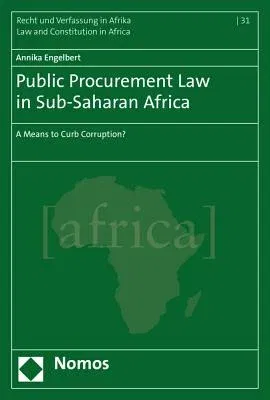Annika Engelbert
(Author)Public Procurement Law in Sub-Saharan Africa: A Means to Curb Corruption?Paperback, 31 March 2017

Qty
1
Turbo
Ships in 2 - 3 days
Only 3 left
Free Delivery
Cash on Delivery
15 Days
Free Returns
Secure Checkout

Print Length
289 pages
Language
English
Publisher
Nomos Verlagsgesellschaft
Date Published
31 Mar 2017
ISBN-10
3848740265
ISBN-13
9783848740260
Description
Product Details
Author:
Book Format:
Paperback
Country of Origin:
US
Date Published:
31 March 2017
ISBN-10:
3848740265
ISBN-13:
9783848740260
Language:
English
Location:
Baden-Baden
Pages:
289
Publisher:
Weight:
371.95 gm